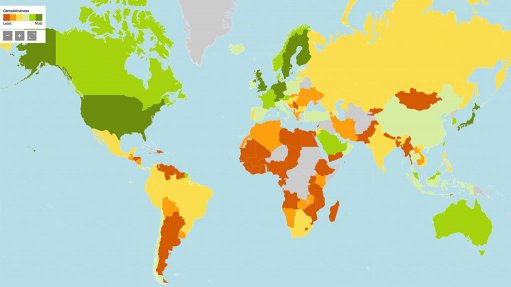
South Africa ranked fifty-third in the World Economic Forum’s (WEF’s) Global Competitiveness Index (GCI) for 2013/14, overtaking Brazil to place second among the five Brics countries, which also include Russia, India and China.
South Africa, however, dropped one place overall and was overtaken by Mauritius, which ranked forty-fifth, as the most competitive country in sub-Saharan Africa.
South Africa ranked well with regard to the efficiency of its institutions, including those concerned with intellectual property protection, property rights and administering its legal framework in challenging and settling disputes.
The high accountability of the country’s private institutions, for which it was ranked second, supported this framework, with financial market development remaining impressive in third place overall, the WEF stressed.
“Building a skilled labour force and creating sufficient employment present considerable challenges for South Africa,” the WEF added.
South Africa’s labour market efficiency was ranked 116th, with hiring and firing practices ranked 147th and flexible wage determination ranking 144th.
The country placed 148th, or last, with regard to labour-employee relations.
Further, the quality of the South African educational system ranked 146th. South Africa also ranked 148th, or last, in the world in the quality of math and science education, which was down from 143rd in 2012/13.
“Raising educational standards and making the labour market more efficient will be critical in view of the country’s high unemployment rate of more than 20%, with the rate of youth unemployment estimated at close to 50%,” the WEF said.
Business Unity South Africa (Busa) commented that the GCI gave a balanced and realistic assessment of South Africa’s socioeconomic strengths and weaknesses.
“Despite the weaknesses identified in the survey, South Africa still remains a dominant economy in the African context, although it has been overtaken by Mauritius for the top ranking in sub-Saharan Africa,” the organisation said, adding that, a few years ago, South Africa was ranked thirty-fifth.
“South Africa needs to critically interrogate the causes of this global competitiveness slippage,” Busa stated.
It added that the different components of the GCI, to a large extent, mirrored the diagnosis and framework of the National Development Plan (NDP) and other studies of the South African economy.
“The basic message that emerges from the latest GCI suggests that South Africa’s commitment to the NDP framework and the need to align both public and private sector actions with it, remains essential.
“The country’s growth and development targets need to be underpinned by its ability to mobilise a bigger share of world trade and investment. The challenge is to implement policies to ensure that, by enhancing South Africa’s global competitiveness, the economy is able to more successfully address the imperatives of unemployment, poverty and inequality,” Busa said.
Meanwhile, the WEF commented that sub-Saharan Africa, in general, trailed the rest of the world in global competitiveness, requiring efforts across many areas to place the region on a sustainable growth and development path going forward.
“The region continues to register a profound infrastructure deficit and continues to underperform significantly in providing healthcare and basic education,” the WEF said.
It added that the region’s poor performance across all basic requirements for competitiveness stood in stark contrast to its stronger performance in the efficiency of its market institutions, which meant the region’s middle-income economies fared relatively well, with South Africa, Mauritius and Kenya ranking in the top 20% with regard to financial market development.
Technology uptake in the region remained weak with only South Africa, Mauritius and Seychelles featuring in the top half of the GCI ranking.
Behind Mauritius and South Africa was Rwanda, which ranked sixty-sixth, Botswana, which moved up five places to seventy-fourth and Seychelles, which ranked eightieth in the overall GCI.
Globally, the top ten remained dominated by Europe, with Switzerland, which placed first, as well as Finland, Germany, Sweden, the Netherlands and the UK ranking among the most competitive economies.
Three Asian countries also featured in the top ten with Singapore remaining the second-most competitive economy and Hong Kong and Japan placing seventh and ninth respectively.
“It is worth noting that the vast majority of the top ten competitive economies share strengths in innovation and a strong institutional fra